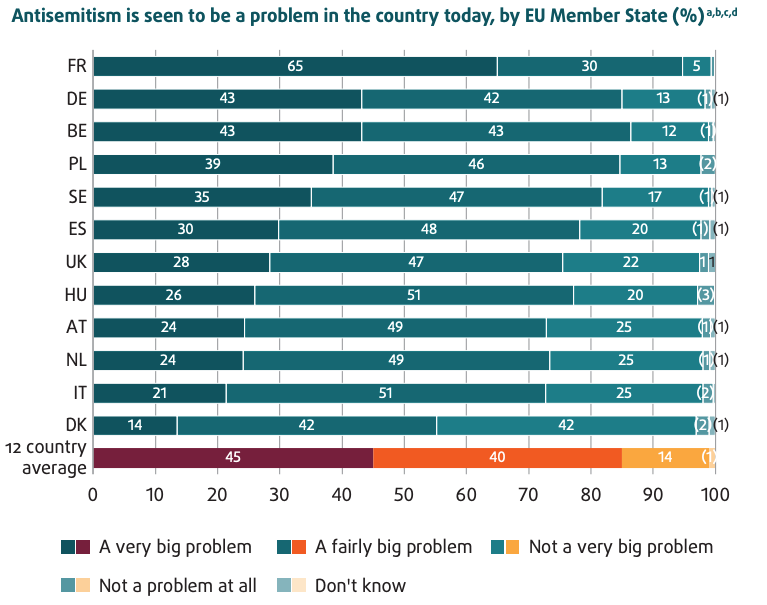90% of European Jews say anti-Semitism is getting worse

A Jewish man performs the Tashlich ritual.
Image: REUTERS/Amir Cohen
Stay up to date:
Roles of Religion
Almost one-in-three Jewish people across Europe have been directly targeted by antisemitic harassment.
From online abuse to being harassed in public, thousands of people told the European Union’s Agency for Fundamental Rights (FRA) antisemitism is impacting their daily lives.

For its Experiences and perceptions of antisemitism – Second survey on discrimination and hate crime against Jews in the EU report, the FRA spoke to 16,395 people across Europe. The report focuses on 12 countries that are home to around 96% of Europe’s Jewish population: Austria, Belgium, Denmark, France, Germany, Hungary, Italy, the Netherlands, Poland, Spain, Sweden and the United Kingdom.

Around 90% of respondents to the FRA’s questions said they feel antisemitism is growing in their country. A similar number say they experience it online, while a staggering 73% say it is evident in public spaces.
The kinds of harassment, abuse, and antisemitic activity uncovered by the FRA include the desecration of Jewish cemeteries, the vandalism of Jewish buildings or institutions, and open expressions of hostility towards Jewish people.
The report also finds that the UK, Germany, Italy, and Sweden are the countries where most people feel there has been an increase in antisemitism (up by 24, 21, 14 and 11 percentage points, respectively).
More than 80% of respondents in Belgium, France, Germany, Poland, and Sweden regard
antisemitism as “a very big” or “a fairly big” problem. But in France, that rises to 95%. When compared with the FRA’s 2012 report, the UK has seen a steep increase in the number of Jews who feel antisemitism is a problem – up from 48% in 2012 to 75% for 2018.
The UK comes out worst for the presence of antisemitism in political life. While the 12-country average is 70%, 84% of British Jews say antisemitism in politics is a very or fairly big problem. This coincides with a wider debate in the UK about the prevalence of antisemitism in the country’s main opposition party, Labour.
Other findings from the FRA report:
- 70% believe their national governments’ efforts to combat antisemitism are ineffective
- 47% of respondents worry about receiving antisemitic verbal insults or being harassed
- 40% worry about being physically attacked
- 38% have considered emigrating because they do not feel safe
- 34% avoid visiting Jewish events or sites because they do not feel safe
Although 85% of Jewish people across Europe told the FRA antisemitism is the biggest social or political problem in countries where they live, almost 80% do not report such incidents to the authorities.

FRA director Michael O’Flaherty highlights one finding as being particularly damning: “It’s not just synagogues that require protection – at countless Jewish community centres and schools, too, special security measures are in place. Jewish people also encounter vicious commentary online, in the media and in politics; endure hostile stares and gestures in their neighbourhoods; come across graffiti and other forms of vandalism; and face discrimination in social settings, at school and at work.
“But a shocking statistic sends a clear message: in the past five years, across 12 EU Member States where Jews have been living for centuries more than one third say that they consider emigrating because they no longer feel safe as Jews.”
Don't miss any update on this topic
Create a free account and access your personalized content collection with our latest publications and analyses.
License and Republishing
World Economic Forum articles may be republished in accordance with the Creative Commons Attribution-NonCommercial-NoDerivatives 4.0 International Public License, and in accordance with our Terms of Use.
The views expressed in this article are those of the author alone and not the World Economic Forum.
Forum Stories newsletter
Bringing you weekly curated insights and analysis on the global issues that matter.
More on Civil SocietySee all
Laura Henderson
June 4, 2025
Daniel Dobrygowski and Giannis Moschos
May 21, 2025
Gustavo Maia
April 22, 2025
Michael Boampong and Kajsa Hallberg Adu
April 16, 2025
Toshihiro (Toshi) Nakamura and Ewa Wojkowska
April 11, 2025
Sophia Otoo and Cynthia Rayner
April 2, 2025





